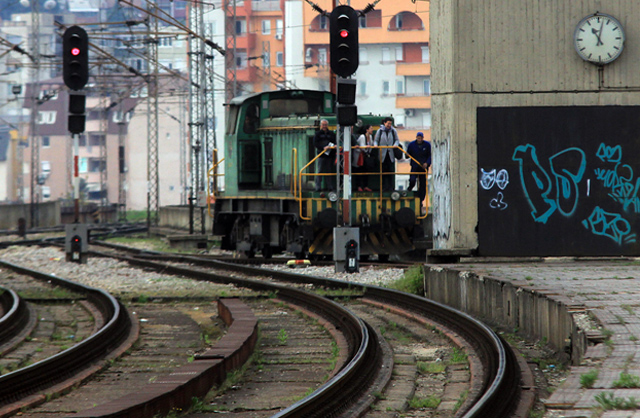Public call to the PE Macedonian Railways and the Government of the Republic of Macedonia
October 30, 2015

The PE Macedonian Railways JSC Transport, in short time period made two corrections of the price of the ticket meant for refugees transiting through Macedonia. The price for each single ticket for these particular users is 25 euros, which is 3,5 times higher than the regular ticket price, which amounts to approximately 7 euros. The regular discounts for children, families and groups do not apply to this category of passengers*. With this decision, the Public Enterprise violates the constitutionally guaranteed rights of the people who transit through Macedonia, as well as the UNO’s 1951 Convention relating to the Status of Refugees, and its accompanying 1967 Protocol on the Status of Refugees, ratified by way of succession by the Assembly of the Republic of Macedonia in 1994.
By raising the price of the tickets for refugees, the PE Macedonian Railways introduced practice of unequal treatment of the refugees and violated the rights contained in Article 29, Paragraph 1 of the Constitution of the Republic of Macedonia, where it is written: “Foreign subjects enjoy freedoms and rights guaranteed by the Constitution in the Republic of Macedonia, under conditions regulated by law and international agreements.” The railway transport is public transport, and according to Article 3, Paragraph 1, Item 1 of the Law on Road Transport, the public transport is available under the same conditions to all users, including the foreign subjects who dwell or transit through the country. Similarly, according to Article 16, Paragraph 2 of the Law on Asylum and Temporary Protection, the foreign subject, while expressing his intention to apply for asylum, has the right to ask for his right to asylum or leave the country within 72 hours, which means that he or she has equal right to use public transport as any citizen of the Republic of Macedonia. Article 29 of the Convention on the Status of Refugees legally binds the contracting parties/countries that they are not going to impose upon the refugees obligations, fees or taxes of any kind, including different ones or higher ones than those which can be imposed upon their own citizens in similar situations.
Volunteers, activists, civil organizations and media stood up against the decision of PE Macedonian Railways. The Ombudsman dispatched a recommendation for abolishing the unequal treatment and reduction of the tickets’ price, in conformity with the regular prices. PE Macedonian Railways came out with the explanation that the reason behind the increase of the price for the refugees’ tickets were the increased expenses caused by the surge of passengers. Unfortunately, the public remained bereft of the explanation why the PE failed to improve the services it offers proportionately with the increase of the ticket’s price. Moreover, the Public Enterprise has not offered a rationale nor in any way has justified the fact that it makes profit on account of the additional financial burden imposed upon the refugees. The PE Macedonian Railways and the Government of the Republic of Macedonia owe to the public answers to the following questions:
1.Why the PE Macedonian Railways breaches Article 29, Paragraph 1 of the Constitution of the Republic of Macedonia, and violates the rights of the refugees by introducing unequal treatment while offering goods and services?
2.Why the Decision on price correction is still not available to the public, despite the management’s claim that it was adopted in accordance with the law?**
3.Which are the legal instruments that the PE Macedonian Railways is using in order to be able to charge, on daily basis and without any control, effective foreign currency from foreign citizens in cash?***
4.Have the competent authorities and bodies exerted, or are they going to exert supervision over the financial operations of the PE Macedonian Railways, considering that the PE is charging goods and services without issuing fiscal bills and without possessing authorised fiscal cash register, which is violation of Article 21-b of the Law on Registering Cash Paymeunt.****
5.Whether, where and how the turnover and the income from these foreign currency payments in cash, made by the Public Enterprise, will be registered, and whether they are earned pursuant to the legal regulations and conditions for collection of cash foreign currency by Public Enterprises, stipulated by the National Bank of the Republic of Macedonia.
* Benefits for transport of passengers in domestic road traffic. https://www.mztransportad.com.mk/dokumenti/DZEPNO%2014-15.pdf , p. 15
** Interview with the Deputy Ombudsman Ms. Vaska Bajramovska Mustafa, in which she expresses her doubt in the existence of the Decision, which was requested by, but never delivered to the Office of the Ombudsman. https://plusinfo.mk/vest/40893/poskapite-bileti-za-migrantite-se-diskriminacija
*** The Law on Foreign Exchange Operations Article 56-a, Paragraph 20, on payment and collection of cash foreign currency in transactions with nonresidents contrary to the method and conditions determined by the National Bank of the Republic of Macedonia (Article 27), considering that the tickets are being payed in euros.
**** The Law on Registering Cash Payment obligates all tax payers, without exception, who trade in goods and services which are not payable through a bank, to necessarily use authorized fiscal cash register and to issue fiscal bills. Pursuant to Article 21-b, Paragraphs 2 and 3, the PE Macedonian Railways should pay fine of 5.000 euros; furthermore, a fine in amount of 30% of the fine meted out to the legal entity and the individual merchant will be admeasured to the responsible person representing the legal entity and to the responsible person connected with the individual merchant on account of breaching Paragraph 1 of this Article. Fine in amount of 500 to 700 euros in denar countervalue will be admeasured to the tax payer – natural person – on account of breaching Paragraph 1 of the same Article.


